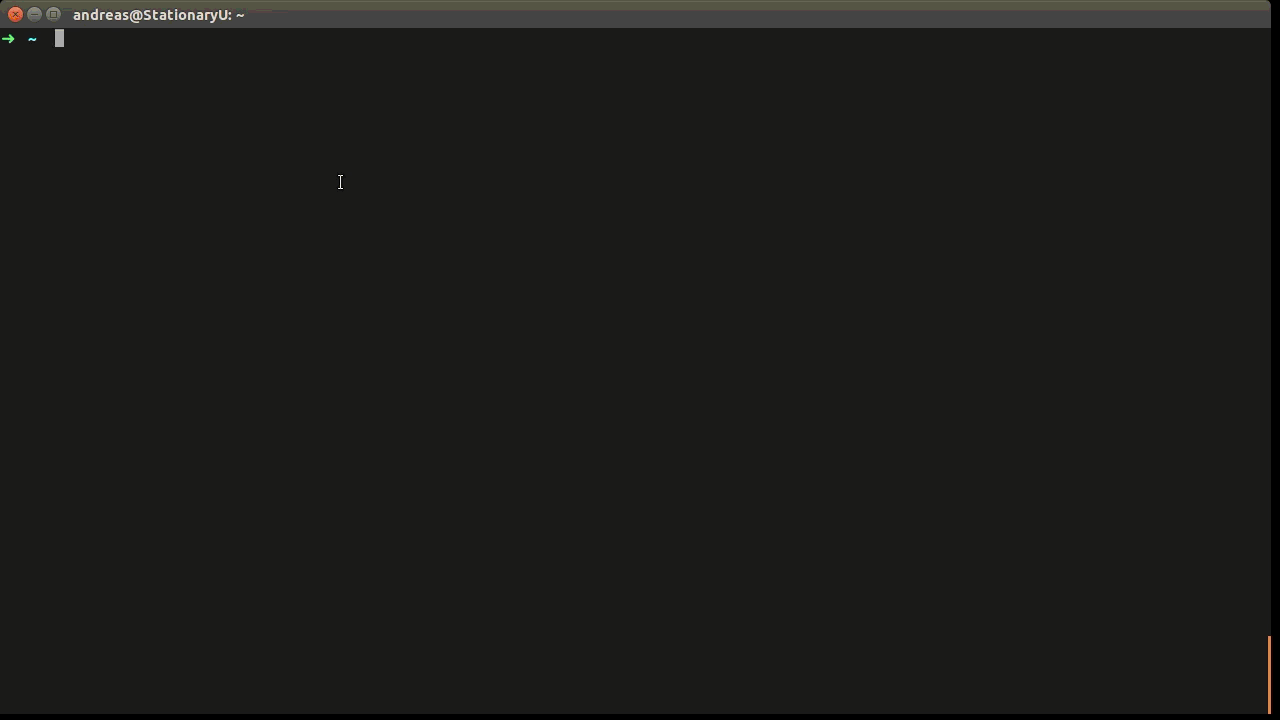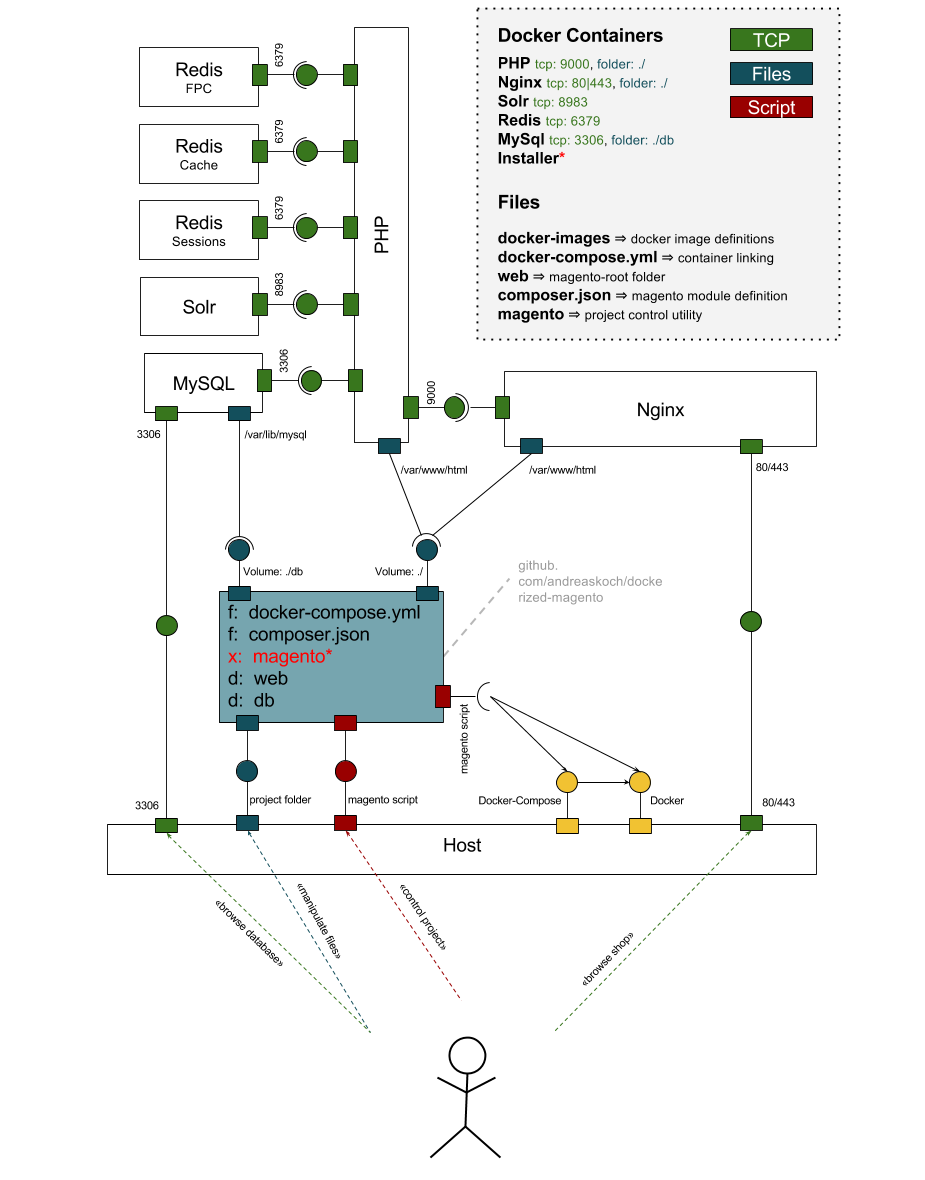Dockerized - Magento Community Edition 1.9.x
A dockerized version of "Magento Community Edition 1.9.x"
Requirements
Before you start you should install
or
You can use vagrant if you are on Windows or a Mac
Installation
- Make sure you have docker and docker
- Clone the repository
- Start the projects using
./magento startordocker-compose up
git clone https://github.com/andreaskoch/dockerized-magento.git && cd dockerized-magento
./magento startDuring the first start of the project docker-compose will
- first build all docker-images referenced in the docker-compose.yml
- then start the containers
- and trigger the installer which will
- install magento and all modules that are referenced in the composer.json using
composerinto the web folder - download the Magento Demo Store Sample Data
- copy the files to the magento-root
- import the sample database
- and finally reindex all indices
- install magento and all modules that are referenced in the composer.json using
Once the installation is fininished the installer will print the URL and the credentials for the backend to the installer log:
...
installer_1 | Frontend: http://127.0.0.1/
installer_1 | Backend: http://127.0.0.1/admin
installer_1 | - Username: admin
installer_1 | - Password: password123
Note: The build process and the installation process will take a while if you start the project for the first time. After thats finished starting and stoping the project will be a matter of seconds.
Usage
You can control the project using the built-in magento-script which is basically just a wrapper for docker and docker-compose that offers some convenience features:
./magento <action>Available Actons
- start: Starts the docker containers (and triggers the installation if magento is not yet installed)
- stop: Stops all docker containers
- restart: Restarts all docker containers and flushes the cache
- status: Prints the status of all docker containers
- magerun: Executes magerun in the magento root directory
- composer: Executes composer in the magento root directory
- enter: Enters the bash of a given container type (e.g. php, mysql, ...)
- destroy: Stops all containers and removes all data
Note: The magento-script is just a small wrapper arround docker-compose. You can just use docker-compose directly.
Components
Overview
The dockerized Magento project consists of the following components:
- docker images
- a shell script for controlling the project:
./magento <action> - a composer-file for managing the Magento modules
- and the docker-compose.yml-file which connects all components
The component-diagram should give you a general idea* how all components of the "dockerized Magento" project are connected:
* The diagram is just an attempt to visualize the dependencies between the different components. You can get the complete picture by studying the docker-compose file: docker-compose.yml
Even though the setup might seem complex, the usage is thanks to docker really easy.
If you are interested in a guide on how to dockerize a Magento shop yourself you can have a look at a blog-post of mine: Dockerizing Magento on AndyK Docs
Custom Configuration
All parameters of the Magento installation are defined via environment variables that are set in the docker-compose.yml file - if you want to tailor the Magento Shop installation to your needs you can do so by modifying the environment variables before you start the project.
If you have started the shop before you must repeat the installation process in order to apply changes:
- Modify the parameters in the
docker-compose.yml - Shutdown the containers and remove all data (
./magento destroy) - Start the containers again (
./magento start)
Changing the domain name
I set the default domain name to 127.0.0.1 so you can access the shop without modifying your hosts-file. But you can simply change that by replacing 127.0.0.1 with your-domain.tld.
The domain name used as the base url for the Magento installation is referenced three times in the docker-compose.yml:
installer:
environment:
DOMAIN: 127.0.0.1
nginx:
domainname: 127.0.0.1
environment:
DOMAIN: 127.0.0.1- In the
DOMAINenvironment variable for the installer - In
domainnameattribute of the nginx container - In the
DOMAINenvironment variable for the nginx container
Using a different SSL certiticate
By default I chose the snakeoil dummy certificate that is installed on Ubuntu systems. If you are on a different system or want to use a real SSL certificate for your shop you can change the environment variables of the nginx container:
SSL_CERTIFICATE_PATHfor the path to *.pem or *.crt fileSSL_CERTIFICATE_KEY_PATHfor the path to the *.key file
nginx:
environment:
SSL_CERTIFICATE_PATH: <path-to-your-certificate>
SSL_CERTIFICATE_KEY_PATH: <path-to-your-certificates-private-key>Adapt Magento Installation Parameters
If you want to install Magento using your own admin-user or change the password, email-adreess or name you can change the environment variable of the installer that begin with ADMIN_:
ADMIN_USERNAME: The username of the admin userADMIN_FIRSTNAME: The first name of the admin userADMIN_LASTNAME: The last name of the admin userADMIN_PASSWORD: The password for the admin userADMIN_EMAIL: The email address of the admin user (Note: Make sure it has a valid syntax. Otherwise Magento will not install.)ADMIN_FRONTNAME: The name of the backend route (e.g.http://127.0.0.1/admin)
installer:
build: docker-images/installer
environment:
ADMIN_USERNAME: admin
ADMIN_FIRSTNAME: Admin
ADMIN_LASTNAME: Inistrator
ADMIN_PASSWORD: password123
ADMIN_FRONTNAME: admin
ADMIN_EMAIL: admin@example.comChange the MySQL Root User Password
I chose a very weak passwords for the MySQL root-user. You can change it by modifiying the respective environment variables for the mysql-container ... and installer because otherwise the installation will fail:
installer:
environment:
MYSQL_PASSWORD: <your-mysql-root-user-password>
mysql:
environment:
MYSQL_ROOT_PASSWORD: <your-mysql-root-user-password>
